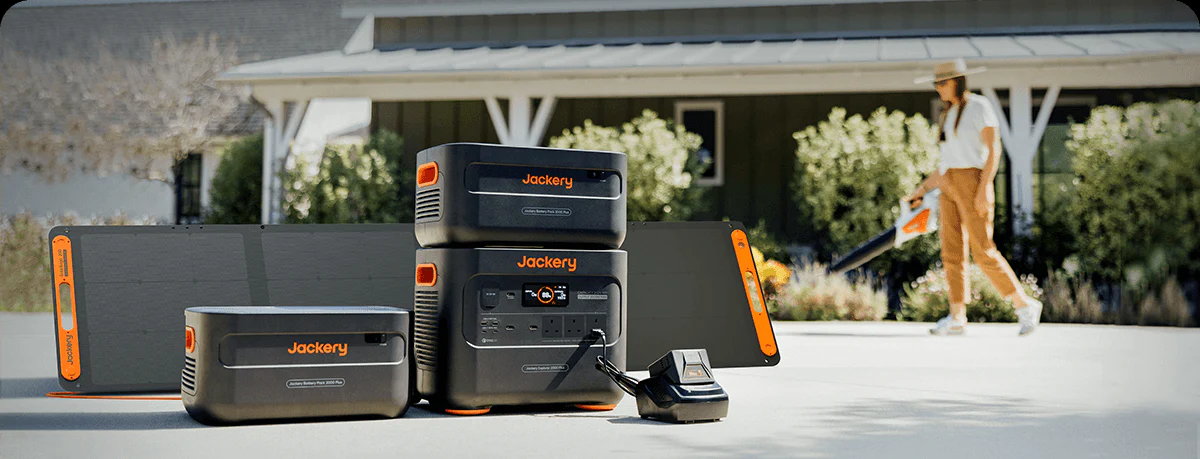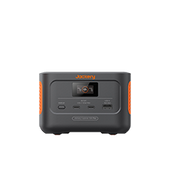What is the Best Backup Generator for Off-grid Living?
In the UK, off-grid living has been burgeoned by a swelling desire to reconnect with nature and escape the relentless pace of modern life. While stressing a return to simpler living, this lifestyle doesn't need sacrificing comfort. Technological advancements in sustainable and energy-efficient appliances have made living comfortable while making off-grid more practicable than ever.
Off-grid life inevitably requires the preparation of independent power sources that can maintain daily needs. Solar power stations as a home backup generator UK solution are viable to meet the energy requirements of off-grid living. These systems are bespoke for individual needs and use solar energy as a sustainable power source. They're intended to be low-maintenance and can be scaled for fluctuating energy demands, promising a steady power supply throughout the year.

Different Types of Backup Generators for Off-Grid Living
There are many types of off-grid generators, so how do you choose the most suitable one? The following section can give you some suggestions. Here, we talk about three basic types of generators.
1. Diesel Backup Generators
Diesel backup generators are an off-grid living energy solution with characteristics like high energy density, long lifespan, and fuel stability. They can provide stable power output and are a good choice for off-grid houses with insufficient renewable resources or high energy demand.
Their high energy density means they can provide a steady power supply for protracted periods for off-grid homes with considerable energy needs, including homes with large-scale farms. Diesel engines are considered durable and a reliable backup power source over many years. Furthermore, diesel backup generators are advantageous where energy usage is erratic or seasonal. For example, in agricultural settings where energy demands peak during certain times of the year, a diesel generator can scale up for the increased load.
Due to the need for diesel power generation in this type of generator, households need to consider purchasing and storing fuel to prevent challenges caused by fuel interruptions. Moreover, the environmental considerations should also be paid attention. Diesel backup generators will emit pollutants and cause carbon emissions.
2. Wind Backup Generators
Wind backup generators utilise natural wind energy for electricity, rendering them a maintainable and renewable option. They are appropriate for locations on higher ground or coastal areas with higher wind speeds. Wind generators work more efficiently in open spaces, which are away from obstructions that can disrupt wind flow. These kinds of generators have a low carbon footprint, making them ideal for environmentally-conscious individuals or families.
Moreover, wind backup generators are cost-effective over the long term. After the preliminary setup costs, the ongoing expenses are lower while focusing on maintenance. It makes them viable for ordinary families and small farms seeking energy independence with abated environmental impact.
Nevertheless, wind generators require a certain wind speed to be efficient, while wind power is one of the most unstable renewable energy sources. Thus, a wind generator can be paired with other backup systems, like solar generators, for a steady energy supply. This complementary method can exploit renewable resources with dependability.
3. Solar Backup Generators
In places with good sunlight exposure in the UK, solar backup generators are an excellent off-grid power source. They convert solar energy into electricity for a clean, renewable power source. In sunny areas, using solar generators can provide continuous and sufficient electricity for home off-grid life. They are popular among individuals who are environmentally conscious and are looking to cut their carbon footprint and dependence on non-renewable energy sources. Solar generators are most fit for families and far-flung locations where sunlight is abundant and reliable.
Additionally, the solar backup battery has low maintenance requirements and a protracted life. Apart from the initial investment, they generate fewer additional expenses, making them one of the most cost-effective energy sources. Solar power generation may be affected by unstable weather conditions, such as reduced efficiency on cloudy and hazy days. Thus, solar systems can be united with battery backup storage solutions or paired with other backup generators, like diesel or wind, for an unceasing power supply. It depends on the actual electricity demand.

Advantages of Portable Backup Generators over Fixed Generators
For off-grid living, portable generators have their unique advantages, including:
1. Small Footprint
Portable solar backup generators offer a perk of spatial efficiency for off-grid living in the UK, where land use can be a constraint. Unlike fixed generators, these units are intended with a compact design. It allows them to be positioned in restricted spaces without compromising functional integrity. For example, some portable solar generators are only the size of a regular suitcase that can be placed in any corner of the home. In contrast, a fixed generator requires a dedicated area for installation.
Moreover, the scalability of these devices is striking. As energy needs grow, supplementary units can be added without requiring complex site preparation or alterations. Their modular tactic is not just space-efficient but also convenient. For instance, users might start with a single unit and add additional units as their power requirements upsurge. This scalability is valuable in the UK, where weather conditions can change without regularity and need adaptable power solutions. So, portable solar backup generators render off-grid energy management flexible with a small footprint.
2. Easy Installation
Portable solar backup generators are also advantageous in terms of installation. They are designed to be installed easily, providing convenience for off-grid residents who may not have immediate access to professional installation services. This type of generator generally does not require complex skills. With a plug-and-play design, the portable solar generator can be connected to existing solar panels or batteries.
Moreover, a standard portable solar generator may have pre-configured connectors and simple user interfaces for hassle-free installation. This ease of installation is helpful for off-grid living, allowing for rapid deployment in emergency situations that require an immediate power supply.
Apart from that, portable generators also have low maintenance costs. Their design includes user-friendly components accessible for routine checks and minor repairs, helping save resources. Therefore, this home backup generator UK can help minimise downtime to the greatest extent and ensure unfailing off-grid living.
3. Easy to Disassemble and Clean
Finally, ease of disassembly and cleaning is another major advantage of portable backup generators. Regular cleaning and maintenance of solar equipment can help maintain its power generation efficiency when the weather is humid or dry, preventing stains or dust from blocking sunlight. For instance, the solar panels of these generators might be detached and cleaned separately for the finest performance in less-than-ideal weather conditions.
In addition, the ease of disassembling these generators promotes thorough maintenance and inspection. Regular maintenance can extend the expected life of a backup generator, and the modular design of portable units renders this task much more straightforward.
Users can check the interface and display screen of the power station and the surface condition of solar panels at any time. This flexibility is not usually found in fixed generators, rendering portable solar backup generators more practical for those living off-grid in the UK, providing a steadfast power solution for many off-grid applications.
Issues to Consider When Selecting a Backup Generator
When selecting a backup generator for off-grid living, consider specific considerations. Firstly, the generator type is dominant. Options include diesel, wind, or solar backup generators, each with discrete advantages in efficiency and environmental impact. Secondly, assess the generator's volume or size so it adapts to your space constraints and power requirements. What is more, consider the applicable temperature range since extreme conditions can affect performance.
Battery capacity is another factor. A higher capacity allows for longer backup times in off-grid scenarios without frequent charging. In addition, checking the maintenance support of the generator is also a necessary item before purchasing. If there are any problems with the generator in the future, you don't have to worry about your investment and off-grid life being affected. Finally, evaluate additional functions like inverter technology for stable and consistent power output, remote monitoring, and noise reduction, heightening the generator's utility and user experience.

How Much Capacity of Backup Generators are Needed?
Different electricity demands determine the size of backup generators. The following are two types of capacities Jackery provides for off-grid living.
1. 2000Wh Backup Generator: Jackery Solar Generator 2000 Plus:
For off-grid living in the UK, the Jackery Solar Generator 2000 Plus, with its 2kWh to 12kWh capacity, can power a broad range of appliances. Specifically, our generator can manage the energy demands of household devices like refrigerators. It can handle up to 3000W heavy duties, rendering it apt for intermittent use of high-demand appliances like electric kettles and electric pressure cookers.
Importantly, our generator's compliance with solar charging (feasible in about 2 hours with the 6 Jackery SolarSaga 200W solar panels) supports sustainable living practices in off-grid scenarios. For example, lighting, electric devices, and kitchen appliances could be simultaneously powered on a usual day. It ensures the best use of our generator's capacity.
2. 1500Wh Backup Generator: Jackery Solar Generator 1500 Pro:
Meanwhile, the Jackery Solar Generator 1500 Pro, with a 1512Wh capacity, is suitable for off-grid living settings in the UK with a moderately lower energy demand. It can power essential electronics and small appliances, like laptops, LED lighting, and cooking devices. The point that the Jackery Solar Generator 1500 Pro can supply up to 1800W in surge power also allows the occasional use of more energy-intensive appliances, including electric ovens and coffee makers.
Our generator's solar charging capability, which takes about 2 hours for a complete charge via 6 Jackery SolarSaga 200W solar panels, is advantageous for off-grid living, where dependence on renewable energy sources is frequently a priority. For example, in a scenario where basic digital connectivity, lighting and occasional use of kitchen gadgets are the primary requirements, the Jackery Solar Generator 1500 Pro can meet these needs without expanding its capacity.
FAQs for Backup Generators
Here, we introduce the most frequently asked questions about backup generators.
1. Are Backup Generators Efficient?
Solar backup generators convert solar energy into electrical power with high efficiency, usually 25%. Factors like solar panel quality, inverter efficiency, and environmental conditions influence this efficiency. Meaningfully, solar generators produce no emissions during operation, so they become a justifiable alternative to fossil fuel-based generators. However, the variability of weather conditions and daylight requires users to plan for energy storage or supplementary power sources during elongated periods of low sunlight.
2. What is the Expected Lifespan?
Characteristically, solar backup generators have a lifespan that depends on two key components: solar panels and batteries. Solar panels might generally last between 25 and 30 years while upholding high efficiency at the end of this period.[1] In the interim, the portable power stations have a lifespan of up to 10 years based on the number of charge cycles they're rated for. Note that systematic maintenance, appropriate usage, and storage settings can influence the authentic life expectancy of these components.
3. How Long is the Standby Time of the Product, and How to Store it?
The standby time of a solar backup generator is contingent on its battery capacity, measured in watt-hours (Wh). When the initial electricity level is 30%, it can still leave 20% or even more after one year. If users want to maximise standby time, they should regularly keep the battery charge at an intermediate level. For long-term storage, you should store the generator in a cool, dry place and periodically recharge the battery to preclude degradation. Remember that proper storage conditions help preserve the battery's health and lengthen the generator's natural life.
Conclusion
Jackery concentrates on portable power solutions with lithium battery technology to certify permanence and efficiency in our backup generator for home UK. Furthermore, our products feature high efficiency and are portable, which makes environmentally friendly and renewable energy harnessing feasible. It is helpful in off-grid circumstances or as a backup during power outages. The integrated battery management system also safeguards against overcharging, short-circuiting, and temperature fluctuations for the sake of better user safety and product durability.
Add solar backup generators to your shopping list now and incorporate them into the increasingly popular off-grid lifestyle in the UK!
References
[1] How Long Do Solar Panels Last? Available at: https://www.forbes.com/home-improvement/solar/how-long-do-solar-panels-last. (Accessed: 5 December 2023)





























































































